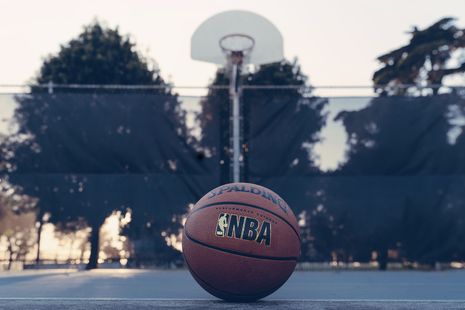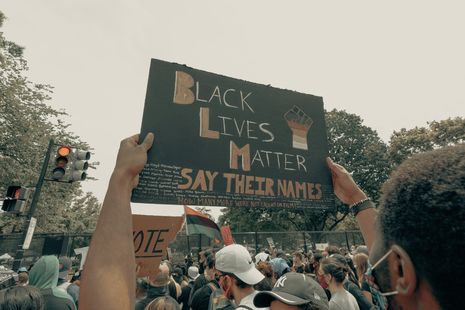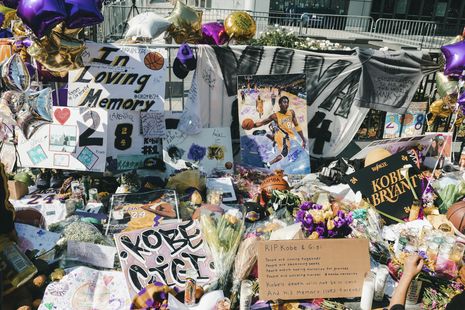Beyond Basketball
With the 2020 NBA Playoffs in full-swing, Dan Se, David Quan and Nicholas Testa detail the current climate in the USA and globally, on and off the court; tracing what promises to be the lingering effects of change following the COVID-induced freeze to the league and the powerful influence of the Black Lives Matter movement.

It is not known exactly what LeBron James said and felt when he left the meeting that would decide the fate of the NBA’s COVID-era restart. There’s a certain allure to this mystique, no doubt cultivated by the media, which highlights the dilemma of a man who must not only remain throned as the face of the sport, but also as a titanic role model for generations of young African-Americans to come. It appears that the league had come to an anagnorisis. Now, more than ever, the NBA has chosen to transcend commercialised spectacle.
Constructing Normalcy
The pre-pandemic mundanity of gruelling back to backs and time zone negotiation has been compressed into the Southern swelter of Disney World, Florida. The season continues under a framework of comprehensive restrictions, such as mandatory mask-wearing and confining players to a so-called ‘bubble’, which is enforced by competitive sanctions. Players were also given the option to opt-out of the restart over health or personal concerns; a choice which incurred a somewhat coercive salary deduction. This $170 million gamble has set the standard for restart protections across sporting codes, remaining without a positive test for Coronavirus.
Leveraging the Freeze

The primary narrative of the restart has been less about dodging the virus and more a discourse of activism. The tragic killing of George Floyd and corresponding surge of the Black Lives Matter movement has served as a turning point for many players – particularly financially valuable stars – to exercise their labour rights and strike against the season’s continuation. Many of them remain determined, for the current transitional climate, to deliver tangible indicia of improving protections against institutionalised racism.
Negotiations between the Player’s Association and the NBA promised that the restart would be contingent upon the full commitment of the league, and its teams (in their corporate entirety) to this aim. The NBA has subsequently provided a number of opportunities for players to advance the cause of anti-racism. This includes the ability to replace jersey names with a progressive slogan – such as “EQUALITY”, “SAY HER NAME”, “RESPECT US” or “HOW MANY MORE” – alongside the application of similar slogans to the courts and team apparel. So far, this has worked to normalise the presence of change and prevent awareness of these issues from declining.
The concerns about these measures’ efficacy seem valid, particularly as the clock bleeds by on the playoff schedule. It becomes difficult to distinguish between symbolic offerings of appeasement and policies genuinely intended to enable equality for generations to come. It would also, however, be naïve to think of the NBA as strictly instituting one or the other; to see them only in pursuit of profit incentives, or to be blind to such a motivation entirely. Regardless of the league’s motivations, it is useful for a sport so culturally valuable to African American communities to act as an arena for their continuing liberation.
“It becomes difficult to distinguish between symbolic offerings of appeasement and policies genuinely intended to enable equality for generations to come.”
Remembering Heroes

A good deal of contemporary basketball coverage focuses upon ‘legacy’ as the ultimate measure of an individual, figuring it as the benchmark of purpose. Although the metaphysical roots of such a theme could be discussed, it seems more prudent to observe how tragic deaths amplify this type of coverage. The loss of Kobe Bryant in a helicopter accident earlier this year was premature and thoroughly disturbing. It reminded fans globally that there is unique value in sport; to think that a stranger, equipped only with a killer fadeaway and unprecedented confidence, could captivate and enthral on an emotional level was startling. Assisted by urban myth and burgeoning public access to television, Kobe became a legend through his hunger for perfection, rekindling the ‘hero-ball’ legacy of Michael Jordan.
Yet, we must remain wary of subjecting sporting superstars to a process of neo-Christian deification: we cannot ignore the flaws that make them human. It is often too easy to see supernatural giants in a sport so reliant upon physical stature and athleticism. This causes the media to dismiss and sideline the darker nature of stars, such as Kobe Bryant’s sexual assault case and 10 time All-Star Jason Kidd’s various legal issues, amongst various instances of on-court violence – which are treated more as entertainment than harmful occurrences. While such an influence remains pernicious, it is important moving forward to alter this same media power which can be used with great effect to combat racism. Enabling positive change within the wider community must become the legacy left by this current pantheon of stars.
A Closing Sequence
The significance of the 2020 NBA Playoffs, for the reasons above, will go beyond any single box-score, and even the Larry O’Brien trophy. Not only do they represent a triumph of logistics in a virus-ravaged nation, but they demonstrate serious potential for the type of uncomfortable change enabled by such a crisis. As the Conference Semifinals come to a close, the scrutiny placed upon focal players intensifies amidst intertwining narratives of redemption and vengeance, as well as the central focus upon securing an equal future for America. As the season finds its denouement, a nation awaits a promise fulfilled.
 Interviews / You don’t need to peak at Cambridge, says Robin Harding31 December 2025
Interviews / You don’t need to peak at Cambridge, says Robin Harding31 December 2025 Comment / What happened to men at Cambridge?31 December 2025
Comment / What happened to men at Cambridge?31 December 2025 News / Unions protest handling of redundancies at Epidemiology Unit30 December 2025
News / Unions protest handling of redundancies at Epidemiology Unit30 December 2025 Features / ‘Treated like we’re incompetent’: ents officers on college micromanagement30 December 2025
Features / ‘Treated like we’re incompetent’: ents officers on college micromanagement30 December 2025 News / Varsity’s biggest stories of 202531 December 2025
News / Varsity’s biggest stories of 202531 December 2025









